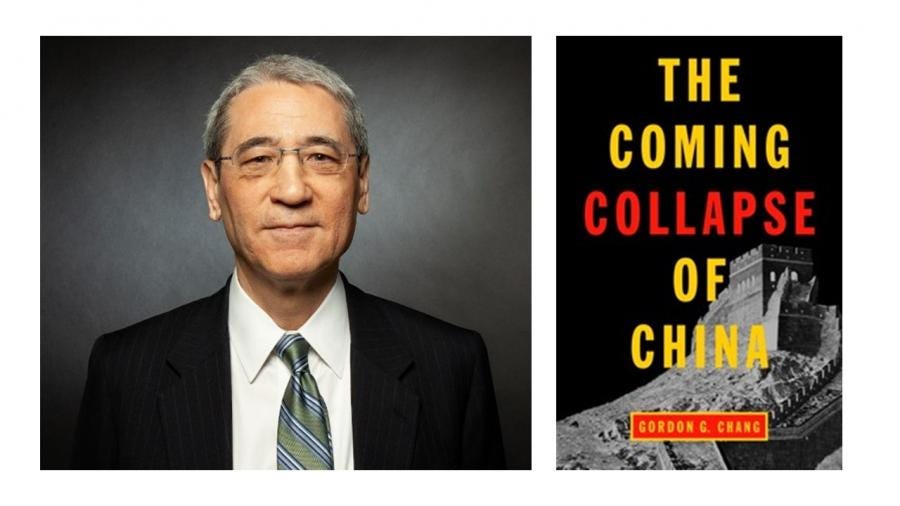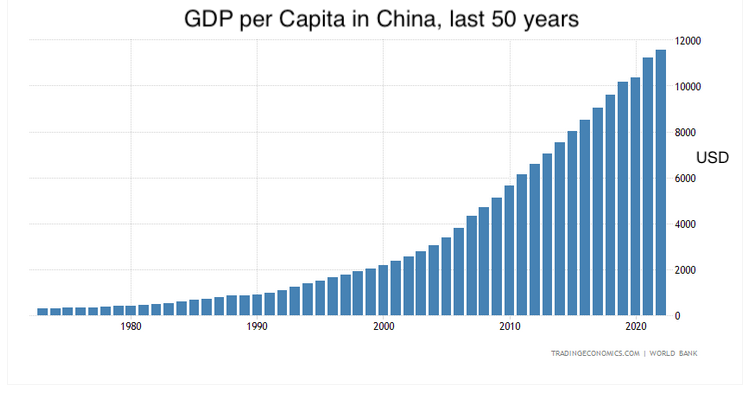我对 Peter Zeihan 的中国崩溃故事进行了事实核查……这会让你震惊
I Fact Checked Peter Zeihan's China Collapse Story...This Will Shock You
https://cyrusjanssen.substack.com/p/i-fact-checked-peter-zeihans-china
CYRUS JANSSEN 2024 年 1 月 9 日
Peter Zeihan 是当今最受欢迎的地缘政治分析师之一。他的 YouTube 频道拥有近 70 万订阅者,他的频道经常获得数百万的观看次数。Zeihan 对中国的未来做出了一些非常大胆的预测。他说话非常自信和流利,至少从表面上看,他的结论似乎是基于事实和坚实的论据。
但我们真的能相信他对中国的分析吗?至关重要的是,他是否对这个国家的文化和历史有足够深入的了解,能够对中国的未来得出正确的结论?还是他缺少只有在那里生活才能获得的关键见解?最重要的是,中国的经济问题是否真的如此严重,以至于很快就会导致整个国家崩溃?让我们在今天的新闻通讯中回答所有这些问题。
首先,必须指出的是,自 2010 年以来,泽汉一直预测中国将在未来十年内崩溃。坦率地说,这与许多其他所谓的“中国专家”的情况类似,他们也一直预测中国即将崩溃,最著名的是声名狼藉的张家辉,几十年来他的许多预测没有一个成真。
张家辉在 2001 年首次预测中国将崩溃。在过去的 23 年里,中国已经“崩溃”成为世界第二大经济体。
还必须指出的是,泽汉既没有在中国生活过,也不会说中文。值得称赞的是,泽汉的预测确实基于中国经济中确实存在的问题,而这些问题实际上非常真实,非常严重。但最重要的问题是:Zeihan 的结论是否有理有据、平衡合理,还是为了获得更多点击量和支持他的叙述而过于简单和耸人听闻?让我们公平地对待 Zeihan,并尽职尽责地审查他的说法。
Zeihan 预测的核心是中国当前令人震惊的人口下降:正如他正确指出的那样,该国人口已在 2010 年左右达到顶峰,此后一直在减少和老龄化。事实上,中国的出生率自 2016 年以来急剧下降,几乎减半,到 2022 年出生人数不足 1000 万,为该国历史上的最低水平。事实上,中国劳动力的迅速减少是该国面临的最紧迫问题之一。Zeihan 表示:“很明显,这个系统正在崩溃,人口崩溃是无法纠正的,40 岁以下的人口数量甚至不足以让他们尝试”。
在 Zeihan 看来,这种系统性崩溃是不可避免的,因为中国没有足够的年轻人,而如果没有年轻人,中国经济目前正在发生两件灾难性的事情。
“现代系统的大部分消费发生在你 20 多岁和 30 多岁的时候,那时你要买车、养育孩子和建造房屋”
“如果没有年轻人,我们看到他们的劳动力成本自 2000 年以来增加了 14 倍,因此墨西哥劳动力的成本现在只有中国劳动力成本的三分之一”。
从本质上讲,Zeihan 断言,由于中国年轻人的数量正在迅速下降:
1) 国内消费,经济增长的重要引擎,正在被摧毁
2) 中国的劳动力成本正在飙升,这将有效地扼杀其工业,因为它们将被墨西哥等拥有更廉价劳动力资源的国家所取代。
Zeihan 还自信地说明了为什么中国工业不再具有竞争力,他的理由会让你大吃一惊:
“他们的教育体系注重记忆而不是技能,因此尽管他们投入了数万亿美元用于无止境的知识产权盗窃,但他们在过去 15 年里并没有在技术上取得任何进步”。
这里有很多问题需要解开,但如果我们深入挖掘,就会发现 Zeihan 的分析存在重大漏洞。首先,让我们来谈谈这个显而易见的问题。坦率地说,声称“中国在过去 15 年里并没有在技术上取得任何进步”是与世隔绝。简单的事实是,到目前为止,中国已经在几个先进行业占据主导地位,包括 5G 电信、电动汽车、智能手机、可再生能源和无人机。而这仅仅是在过去十年中发生的事情。
I Fact Checked Peter Zeihan's China Collapse Story...This Will Shock You
https://cyrusjanssen.substack.com/p/i-fact-checked-peter-zeihans-china
 CYRUS JANSSEN JAN 09, 2024
CYRUS JANSSEN JAN 09, 2024
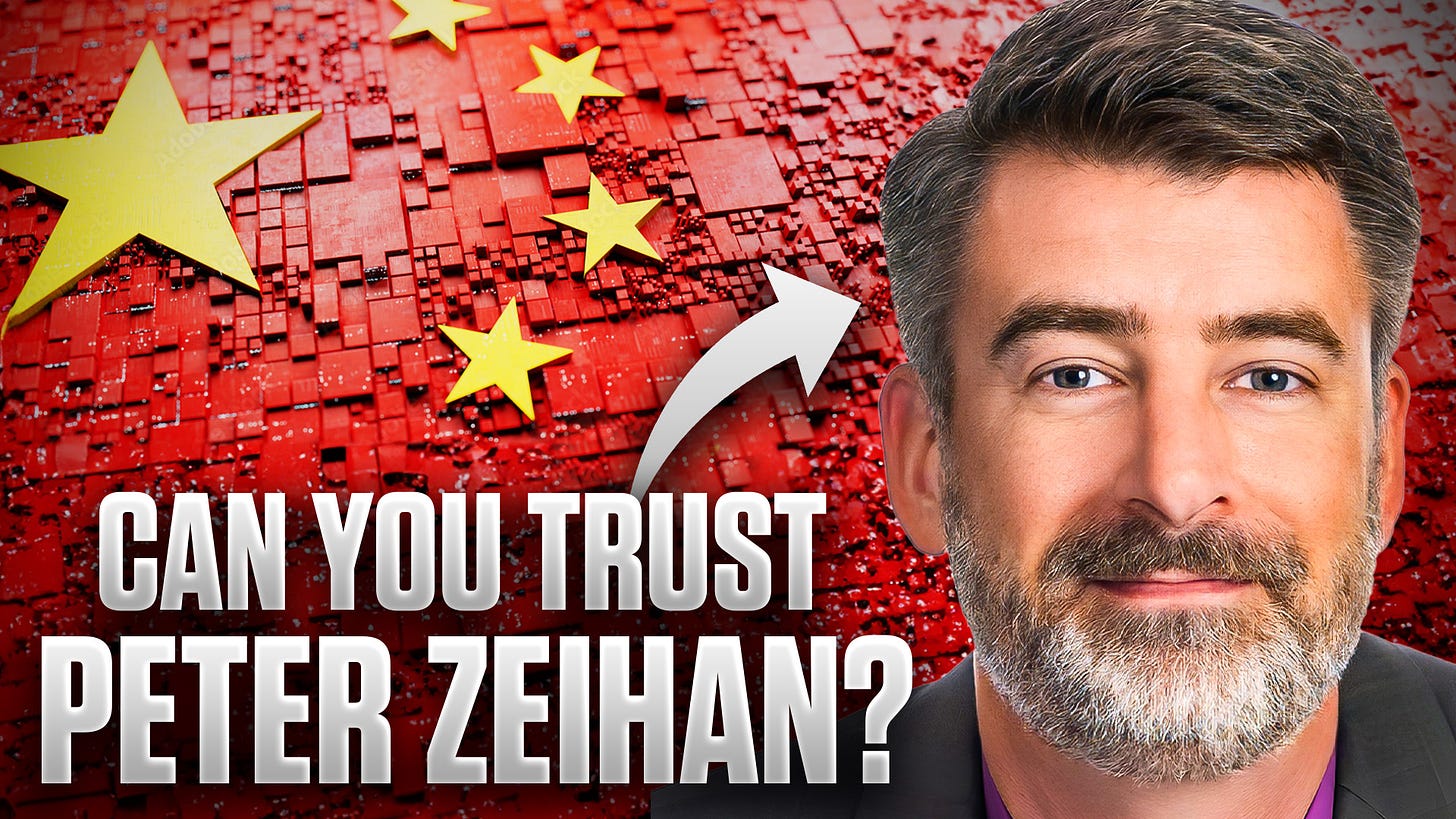 Peter Zeihan is of the most popular geopolitical analysts around today. His YouTube channel has almost 700k subscribers, and his channel regularly rack up millions of views. Zeihan has made some very bold predictions about the future of China. He speaks very confidently and fluently, and on the surface at least, seems to base his conclusions on facts and solid arguments.
Peter Zeihan is of the most popular geopolitical analysts around today. His YouTube channel has almost 700k subscribers, and his channel regularly rack up millions of views. Zeihan has made some very bold predictions about the future of China. He speaks very confidently and fluently, and on the surface at least, seems to base his conclusions on facts and solid arguments.But can we actually trust his analysis on China? Crucially, does he possess deep enough knowledge of the country's culture and history to be able to draw the correct conclusions about China's future? Or is he missing key insights that only come from living there? Most importantly, are China's economic troubles actually so dire that they'll soon lead to the collapse of the entire country? Let’s answer all these questions in today’s newsletter.
First, it's important to point out that Zeihan has been predicting China will collapse within the next decade since 2010. Frankly, this is similar to many other so-called "China experts" who have also persistently predicted the country is close to collapsing, the most well-known being disgraced Gordon Chang, not a single one of whose many predictions over the decades have ever come true.
Gordon Chang first predicted China would collapse in 2001. In the past 23 years, China has “collapsed” to the #2 economy in the world.
It also must be said that Zeihan has neither lived in China nor does he speak Chinese. To his credit, Zeihan does base his predictions on problems in the Chinese economy that are in fact very real and very serious. But the all-important question is this: Are Zeihan’s conclusions well-founded and balanced, or are they simplistic and sensationalized to get more clicks and support his narrative? Let's give Zeihan a fair shake, and do our due diligence in scrutinizing his claims.
The central pillar of Zeihan’s predictions is China's current alarming demographic decline: As he correctly points out, the country's population already peaked around 2010 and has been shrinking and aging ever since. In fact, China's birth rate has dropped sharply and nearly halved since 2016 to under 10 million births in 2022, the lowest in the country's history. Indeed, China's rapidly shrinking labor force is one of the most pressing issues the country faces. According to Zeihan:
"it's obvious that this system is breaking down, the demographic collapse is not correctable, there are not enough people under age 40 for them to even try".
In Zeihan’s view, this systemic collapse is inevitable simply because there aren't enough young people in China, and without them two disastrous things are currently happening to its economy.
"Most of the consumption of a modern system happens when you’re in your 20s and your 30s when you’re buying cars and raising kids and building homes"
"Without young people we’ve seen their labor costs increase by a factor of 14 since the year 2000 so Mexican labor is now one-third the cost of Chinese labor".
Essentially, Zeihan asserts that because the number of young Chinese is rapidly declining:
1) domestic consumption, an important engine of economic growth, is being decimated
2) China's labor costs are skyrocketing, which will effectively kill its industries because they'll be outcompeted and replaced by the likes of Mexico which have cheaper labor pools.
Zeihan also confidently states why Chinese industry isn't competitive anymore, and his reasoning will shock you:
"Their educational system focuses on memorization over skill, so despite a trillion dollars of investment in a bottomless supply of intellectual property theft, they really haven't advanced technologically in the last 15 years".
There's a lot to unpack here, but if we dig a little deeper it becomes clear there are significant cracks in Zeihan's analysis. First, let's address the elephant in the room. Frankly, to claim that "China really hasn't advanced technologically in the last 15 years" is to be living under a rock. The simple truth is that China has come to dominate several advanced industries by now, including 5G telecommunications, EVs, smartphones, renewable energies, and drones. And this is in just the past decade.
A few month ago I also revealed how China's semiconductor industry is rapidly catching up to the cutting edge and recently developed a breakthrough microchip, and this even occurred while China was restricted by US sanctions designed to prevent precisely this kind of leap forward. If you're thinking "Well Cyrus, that's only because, as Zeihan says, China unfairly stole all this technology", this is frankly outdated thinking. While there was a time when China could be called a "copycat nation" things have certainly changed.
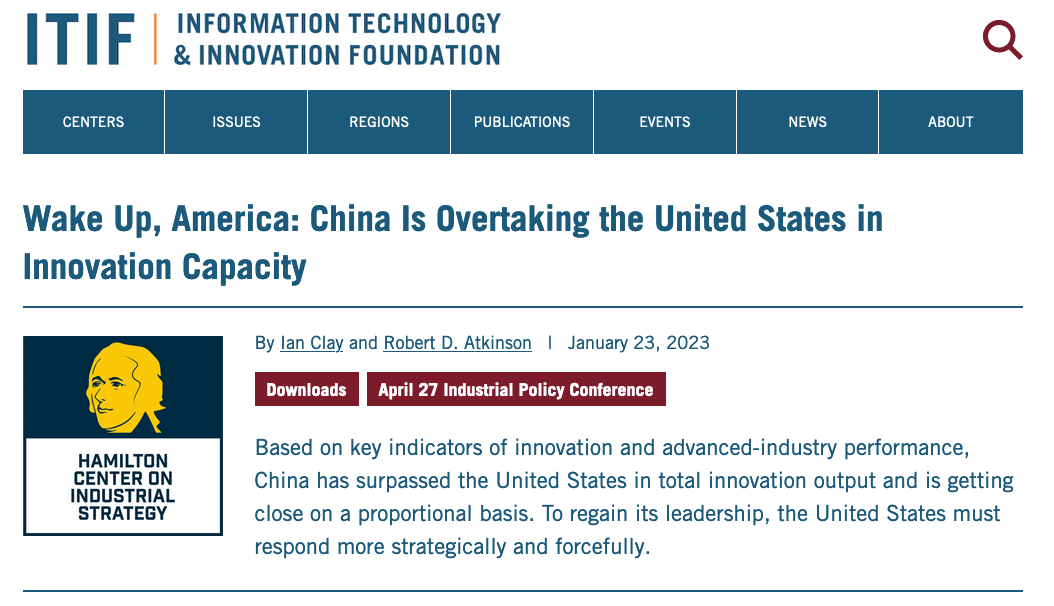 Earlier this year but the world's leading think tank for science and technology based in Washington DC, ITIF, revealed in a comprehensive report that China is now actually more innovative than the US in key measures.
Earlier this year but the world's leading think tank for science and technology based in Washington DC, ITIF, revealed in a comprehensive report that China is now actually more innovative than the US in key measures.
One of the clearest examples of this is that China was the first country to introduce 5G technology to the world through the telecommunications giant Huawei.
There are additional problems with Zeihans's analysis, and I'll reveal them now. First, as economist Dr. Joeri Schasfoort recently pointed out:
"In modern economic systems, most consumption is actually done by those over 35 years old, simply because they earn more money...so even if there are fewer young people in China this will not decimate consumption immediately."
It's actually true that consumption in China is down and hasn't recovered to pre-pandemic levels, but the reason isn't a lack of young people as Dr. Schasfoort points out, but due to a longstanding, key aspect of Chinese culture that Zeihan evidently isn't aware of: The Chinese, especially the older generations, always save for a rainy day.
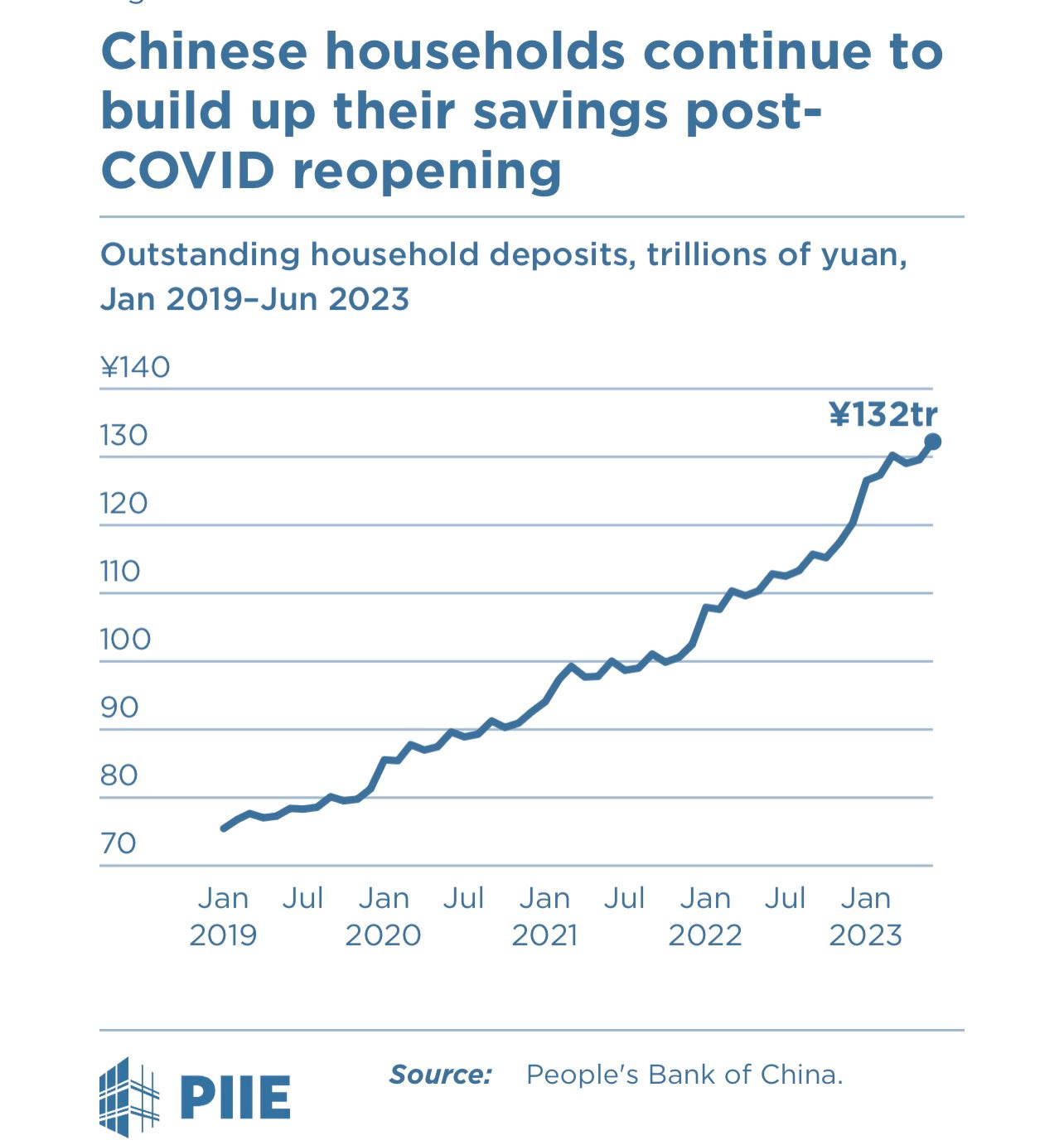 As of June 2023, household savings in bank accounts in China totaled a whopping $18 trillion, compared to only $700 billion in the US. That's almost 6x as much per person than in the US! And as this graph shows, this number is steadily rising.
As of June 2023, household savings in bank accounts in China totaled a whopping $18 trillion, compared to only $700 billion in the US. That's almost 6x as much per person than in the US! And as this graph shows, this number is steadily rising.
Second, the claim that higher labor costs will destroy China's industries is frankly too simplistic, not to mention, simply not true. There's just a lot more going on here. First of all, most of the world hasn't chosen to manufacture their products in China simply because its labor is cheap. Instead, it has everything to do with China's unmatched manufacturing experience and expertise, as well as its supreme supply chain consolidation, which other countries with cheap labor simply don't have. Apple CEO Tim Cook could not have summed it more perfectly:
"There's a confusion about China. The popular conception is that companies come to China because of low labor cost. I'm not sure what part of China they go to, but the truth is China stopped being the low-labor-cost country many years ago. And that is not the reason to come to China from a supply point of view.
The reason is because of the skill, and the quantity of skill in one location and the type of skill it is. The products we do require really advanced tooling, and the precision that you have to have, the tooling and working with the materials that we do are state of the art. And the tooling skill is very deep here.
In the US, you could have a meeting of tooling engineers and I'm not sure we could fill the room. In China, you could fill multiple football fields."
TIM COOK, APPLE CEO
Let this amazing truth-bomb sink in. In addition to this, it's simply not true that higher labor costs will necessarily kill China's industrial competitiveness, just as Japan's rise in wages didn't destroy its competitiveness.
Zeihan also fails to mention several options China can pursue to offset its aging population. While he correctly points out it probably won't be offset by mass immigration since China isn't and never has been an immigrant country, legendary Financial Times economics commentator Martin Wolf has shown that the fall in China's working population can be fully offset for the next 10 years by moving more people from the country's underdeveloped areas to the cities. In addition, China can also simply increase the retirement age above 60 for men, and 50 for women, both of which are well below the world average.
What's more, it's no secret that China is leading the 4th industrial revolution, and so it's actively preparing for a smaller work force with the help of AI and automation. It's also crucial to point out that the relationship between demographics and economic performance actually isn't well-established:
As Dr. Schasfoort again points out:
"there are countries like Nigeria that saw a huge population increase but not a similar economic increase. Similarly, there are countries like Bulgaria which lost almost 10% of its population last decade, but whose economy still grew quite a bit, as workers got more productive."
And importantly, China's productivity is still comparatively low, even below Poland's, so there's still much room for improvement, and there's no doubt the Chinese will as they're still some of the most hardworking people on the planet, and they're determined to build an advanced economy.
Data from the World Bank also backs this up: China's GDP/capita has steadily risen, even skyrocketed at rates double the US', since Deng Xiaoping's big economic reforms in 1978.
It also must be pointed out that MZ picked the most extreme population projection he could find, namely that China's population will halve within the next 45 years! Not only that, but he wrongly quotes the research, claiming the projection is half by 2050, only 27 years from now. I can't say whether this was an accident or intentional, but it's certainly sloppy to say the least. While the research is legitimate, he omits the fact that there are multiple other well-known and legitimate studies whose predictions are far more optimistic such as one in the prestigious medical journal, The Lancet, and one from the UN.
 It's important to point out that this is frankly what Zeihan does: he tends to cherrypick the most extreme research which will draw the most attention and clicks.
It's important to point out that this is frankly what Zeihan does: he tends to cherrypick the most extreme research which will draw the most attention and clicks.
But now it gets bizarre: Zeihan also claims China's collapse is imminent because it is the largest importer of crucial goods such as food and energy. His reasoning is that the US will soon achieve energy independence, after which it'll stop policing the world's oceans. This is turn will create a vacuum that pirates will fill, making international trade very vulnerable. As a result, China's crucial goods will frequently be hijacked and the country will suffer overwhelming food and energy shortages. Of course, there are numerous glaring faults with this analysis:
First, that China needs the US navy to protect its merchant ships from pirates is frankly outdated and even silly. Not only is the US navy no longer suited to protect merchant ships - which Zeihan even stated himself in a recent podcast - but China's navy is actually quite suited for this purpose, not to mention is the larger of the two navies.
Second, if piracy will be a real risk, won't other important-dependent countries such as Germany, Singapore, and Ireland collapse as well?
Third, just because the US achieves energy independence doesn't mean it'll stop policing the world's oceans, since it of course will still depend on numerous other crucial imports.
But it doesn't stop here: China's government has actually built up huge stockpiles of both food and oil to weather precisely these kinds of scenarios. What's more, through megaprojects such as the BRI, China has built up a massive trade network by now that reaches every corner of the globe, and gives it a plethora of options whatever may happen. China has also invested massively in other energy sources, including clean ones, which diversifies its options.
The central pillar Zeihan bases his collapse prediction on besides China's alarming demographic trend is something we've heard time and time again from western media: That China under Xi Jinping has become too authoritarian. Zeihan asserts its this, together with the demographic decline and import dependence, that will hasten China's demise:
"Chairman Xi has so purged the system that it’s an open question whether he can even become aware in a reasonable amount of time that something needs to be done, much less have the capability to come up with a coherent policy to deal with whatever the issue is as it arises."
This has to do with a central misconception the west and western MSM has consistently sold us: We're constantly taught that China's government is a dictatorship in which all power belongs to one man who decides everything, and that it's completely centralized, rigid, and incapable of change.
But a few months ago I broke down the insights of Keyu Jin, a Harvard educated economics professor at the London School of Economics who shatters this narrative and proves China's government is in fact far more decentralized and not the "one man show" the west claims it is.
Finally Zeihan's assertion that the Chinese government is now unable to respond to pressing issues just doesn't add up once you examine the evidence, which is that the government is actively and frankly very visibly responding to literally all of these issues with a wide array of policies and actions:
-
They've completely relaxed the one-child policy, and have enacted several other policies encouraging more births, such as extending both maternity and paternity leave, reducing rent for families with three children, and even straight up paying parents
-
They've invested enormously in technology and R&D in order to become more self-reliant, and that of course includes energy
-
They've built up massive stockpiles of food and energy
-
They've grown and modernized their navy
They even were the ones to pop their own property bubble because they thought it was getting too big. Zeihan claims China's economic collapse would completely wipeout the property market and thus the primary method of savings for most Chinese, decimating any remaining support for the system and government.
While he's correct that an asset bubble at the end of a rapid growth period can collapse an economy, similar to how the US' did in the 1930s, the fact that the government preemptively popped it themselves shows they were actively trying to prevent this. Most importantly, China's banks are state-controlled and thus the government can and likely would keep the financial system from ever collapsing, which will ensure the losses of Chinese households are limited.
Conclusion
In conclusion, Zeihan sheds light on some very real, problematic trends in China which center around its worrying demographic decline. However, the simple truth is the conclusions he draws are far too simplistic and sensationalist, and frankly lack the necessary deep insight into what's really happening on the ground in China. At times the arguments he uses are simply even flat out not true.
Perhaps Zeihan is too committed to the narrative he's long promoted, including in his latest book, which is that globalization has collapsed and our global economy is decoupling. However, as I’ve written about many times, our global economy is alive and well, and the economic coupling between nations is greater than ever, especially with China.
The world absolutely needs China, and its collapse would absolutely catastrophic for the world from an economic standpoint alone, probably leading to the collapse of many other nations as well, including the US. There's a far greater consensus in the west that, if anything, China's economy will simply stagnate like Japan's did in the 1980s after its growth model ran out of steam.
As I’ve consistently preached, it's imperative that we look beyond mainstream headlines and catchy predictions, and seek out voices that truly understand the country: People who have lived or spent considerable time in China, and people who actually speak Chinese and communicate with real Chinese people regularly. Thank you for reading this week’s newsletter and see you all in our next publication.
